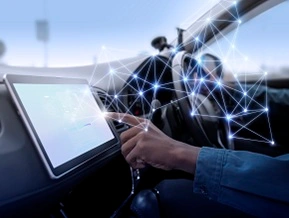The AI for Autonomous Vehicles course offers a comprehensive dive into how artificial intelligence is revolutionizing modern transportation.
AI for Autonomous Vehicles
The AI for Autonomous Vehicles course offers a comprehensive dive into how artificial intelligence is revolutionizing modern transportation. From enabling self-driving capabilities to supporting advanced safety systems, AI plays a pivotal role in the development and functionality of autonomous vehicles. This course is designed to provide learners with a solid foundation in the key AI technologies that power driverless cars, including machine learning, computer vision, data fusion, and decision-making systems.
Covering everything from sensor technologies and object recognition to ethical considerations and smart city integration, this course presents real-world use cases and future innovations in the field of AI and cars. Whether you're a tech enthusiast or an automotive professional, this course will help you understand how AI is transforming the road ahead.
This course is ideal for engineers, developers, data scientists, and technology enthusiasts interested in the intersection of AI and cars. It is particularly suited to those looking to explore careers or innovations in autonomous driving technologies. The course is also valuable for automotive professionals who want to stay updated with AI trends in transportation and for students or researchers pursuing studies in robotics, AI, or automotive engineering. A basic understanding of programming and machine learning will be helpful but is not required.
Understand the role and scope of AI for autonomous vehicles.
Explore the applications of machine learning in driverless car systems.
Analyse how sensor technologies and data fusion enable vehicle perception.
Develop an understanding of computer vision and object detection in cars.
Learn how AI supports path planning and real-time decision-making.
Evaluate ethical and safety concerns related to autonomous driving.
Investigate how AI-powered vehicles integrate into smart city ecosystems.
Discover future trends and challenges shaping autonomous vehicle development.
-
Explore the fundamentals of AI and its transformative role in self-driving technology and modern vehicle systems.
-
Understand how machine learning algorithms enable perception, prediction, and control in autonomous vehicles.
-
Dive into LIDAR, radar, cameras, and how multi-sensor data is fused for accurate vehicle awareness and decision-making.
-
Study how AI identifies pedestrians, vehicles, traffic signs, and other obstacles using real-time image processing.
-
Learn how autonomous vehicles use AI to plan safe paths and respond dynamically to road conditions and traffic.
-
Examine the moral and safety challenges in designing AI systems that make life-critical decisions on the road.
-
Understand how driverless vehicles interact with intelligent infrastructure, traffic systems, and V2X (vehicle-to-everything) communication.
-
Discover the evolving landscape of AI and cars, including upcoming technologies, regulatory challenges, and research opportunities.
Earn a Professional Certificate
Earn a certificate of completion issued by Learn Artificial Intelligence (LAI), accredited by the CPD Standards Office and recognised for supporting personal and professional development.

Key Aspects of Course

CPD Accredited
Earn CPD points to enhance your profile

Free Course
This course is free to study

Self-Paced
No time limits or deadlines

Flexible & 24/7 Access
Learn anytime, anywhere

Build In-Demand Skills
Get job ready

Updated AI Skills
Stay current with AI advancement

Global Learning
Accessible Worldwide

Premium Materials
High-quality resources

Employer Approved
Boost your career prospects



